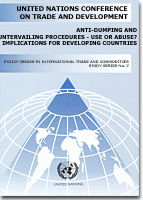
Antidumping (AD) and countervailing (CV) measures have become popular substitutes for traditional trade barriers, which are gradually being reduced in the course of regional and multilateral trade liberalization. As WTO legal, judicial instrument for private parties looking for government-enforced restrictions on competition, resort to AD and CV actions became a frequent tool to tackle problems arising in the context of free trade. Designed as a corrective mechanism, particularly antidumping has been hijacked for protectionist purposes. Gradually replacing conventional tariff-based trade barriers, the advancement of these practices jeopardizes the benefits of tariff reduction and growing economic integration.
This paper analyses distribution, duration and final outcomes of AD and CV investigations. It concludes that anti-dumping and countervailing actions have resulted in significant reductions in trade volumes and market shares. Developing countries establish their position as new players on the AD and CV field, but also continue to be a main target of those practices.
The paper also analyses the WTO Agreements themselves and finds that many of the negative effects of AD and CV measures are not adequately addressed. Loopholes and ambiguities in their provisions open doors for practices constituting abuse rather than use of those instruments. Reforms of the Agreements are urgently required. They should focus on clarifying certain provisions and on the introduction of effective substantial and differential treatment for developing countries.


